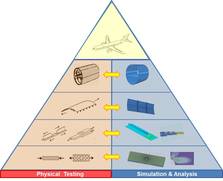Verification and Validation
in Engineering Simulation
Building simulation credibility in an industrial context
15 - 16 June 2017, Stockholm, Sweden
Discounted rates for NAFEMS World Congress participants!
1350 Euro (member)
1700 Euro (non-member)
If you are planning on attending the NAFEMS World Congress, please contact nwc17@nafems.org before registering for this course online, to receive the discounted rate
All rates plus 25 % local Swedish VAT.
The course has been taught over 20 times since 2013 all over Europe.

Overview
Engineering simulation plays an increasing role in industry’s search for competitiveness and technology based innovation at any stage of the design, qualification and certification of their products. Key decisions and product qualification/certification increasingly rely on virtual tests and digital simulations, creating a major paradigm shift inwhich the objective of physical tests is progressively moving from a demonstration of compliance to a reference for analysis validation. This trend in industry is shown through adoption of new terms such as “realistic simulation” and “virtual testing”. This situation creates new responsibility for the engineer to guarantee the required confidence level.
This new approach requires secured processes for the verification and validation (V&V) of simulations bringing evidence of their predictive capability. In particular, programme managers now require formal evidence on “simulation fit for purpose” on which they can build confidence and take decisions. In addition, the increasing situation for extended enterprise creates new constraints to guarantee safe and robust analysis processes.
At the same time, and due to the economic pressure, V&V activities are frequently seen as an additional cost that can easily be reduced and even fully cut, thus underestimating the induced risks. In addition, V&V is not easy to implement because of the diversity of involved persons: managers, simulation experts, test specialists, software developers and quality controllers, software vendors…
Course objectives and benefits
This Master Class is especially dedicated to V&V methodologies for numerical simulation in Engineering. Participants will:
- Understand essential links between the product validation/certification and simulation V&V.
- Learn how to plan and prioritize simulation V&V including physical tests programmes.
- Understand validation test issues and improve synergy between virtual and physical tests in the context of validation.
- Learn how to build business cases allowing for justification of V&V plans.
- Understand simulation V&V organisation and management issues and best practises
- Learn how to implement reporting to bring visibility and confidence to all managers concerned with simulation outcomes.
- Be able to adapt or tailor the course methodologies to their specific industrial context, and further improve their V&V processes and plans.
Who should attend?
- Primarily experienced engineers and senior analysts in charge of simulation activities or preparing to take new responsibility in the management of simulation, especially with regard to V&V responsibility
- Managers in charge of engineering simulation teams and willing to improve their knowledge in V&V and in the relevant processes
- Programme/project managers who need to make critical decisions based on engineering simulation results and wish to increase their understanding and visibility of the required V&V activities
Participants should have a few years of experience in engineering simulation for the designand development of industrial products.
Course context
All industry sectors confronted with numerical simulation V&V are concerned with this course. It is established on the solid knowledge of the tutors and the vision they have developed from their rich industrial experience, mainly within the aerospace and nuclear energy sectors and is primarily illustrated by FEA/Structure Analysis examples. The course is therefore of greatest interest to engineers involved in this technical domain, but will also appeal to engineers from other simulation domains because most of the V&V methodologies which are presented are generic in nature.
The course is neutral and independent of any particular software solution.
We limit the number of participants to a small group to facilitate dialog and exchanges between participants.
2 day Master Class Program
1. Introduction
- Fundamentals of engineering simulation
- Credibility for decision making
2. Verification & Validation of industrial products
- V&V concepts for industrial products
- V&V in Systems Engineering, hierarchical validation
- Innovation in product development and TRL
- Regulations and certification in aeronautics
3. Simulation management with focus on credibility
- Simulation management with focus on capability management
- Key management processes for credibility
− Management of simulation processes and data (SPDM)
− Competence management
4. Simulation V&V foundations & standards
- Basic concepts
− Verification
− Validation and uncertainty quantification
− Predictive capability
− V&V processes
- Guides and standards
− History ofstandardization in V&V
− Main standards: ASME, AIAA, NASA, NAFEMS…
5. Code verification
- Error typology
- Verification of algorithms
- Quality assurance for software: methodologies for SW development, regression tests, exact and manufactured solutions…
6. Verification of analyses
- A priori verifications: formal aspects, check-lists.
- A posteriori verifications: space and time discretization errors, improvement of results.
- Example of verification check-list
7. Validation and simulation / test synergy
- Validation process and hierarchical planning
- Validation tests, simulation / testing collaboration
− Specificities and difficulties of validation tests
− Prerequisites for successful validation tests
− Test uncertainties - Accuracy assessment: deterministic and statistical validation metrics…
- Predictive capability: main attributes and how to assess it?
- Industrial examples
8. Trends in r
- HPC infrastructure trends: new architectures.
- New discretization techniques
- Solver improvements, multi-physics, multi-scale, optimization…
- Impact on V&V plans
9. Simulation Uncertainty Quantification (UQ)
- Typology: random, epistemic uncertainties
- Maturity of existing uncertainty quantification methodologies: Monte Carlo, Latin hypercube, response surfaces, polynomial chaos, “Lack of knowledge” theory, theory of evidence…
- Sensitivity analysis, robustness (key parameters identification…)
- Academic and industrial examples, methodologies and tools
- UQ best practises
10. V&V i
- Responsibilities of V&V processes and actors
- Implementation issues and obstacles
- Simulation, V&V and industrial risks
- Industrial justification: V&V business case, benefits versus costs
- Best practises: planning and prioritization, maturity assessment and reporting to decision makers, organization.
11. Course outcomes and conclusion


 Jean-François IMBERT
Jean-François IMBERT

